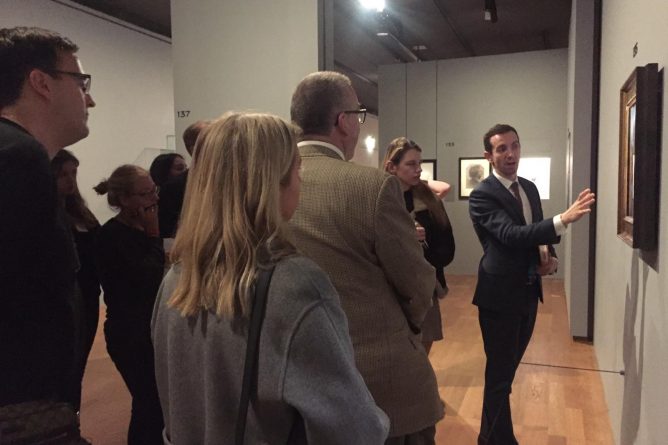Director of the Rome School of Classical and Renaissance Studies, Prof. Tom Henry, led some lucky Kent students on a trip to the Musée du Louvre earlier this week to visit the largest ever Leonardo da Vinci exhibition with its co-curator, M. Vincent Delieuvin.
On Tuesday, when the museum was closed to the general public, Kent students entered the iconic glass pyramid to make their way to the Leonardo exhibition. They then had the privilege of receiving a guided tour through the exhibition, which marks the 500th anniversary of the artist’s death in France in 1519.
Their visit – rendered possible thanks to funding from the School of Arts – was immeasurably enhanced by the generosity of the exhibition’s curator. Delieuvin was on hand to answer every question, to elucidate the decisions taken in mounting the exhibition and to communicate the many new directions in Leonardo research that his ten-year devotion to this project has set in motion.
With these profound insights that only the curator could provide, Kent students were in a prime position to appreciate Leonardo’s art. Given the exhibition’s breath-taking popularity and the scarceness of available tickets, sadly many will not be so fortunate.
Indeed, as Henry argued the evening before the trip in a brief lecture given at the Paris School of Arts and Culture (the Rome School’s sister European centre) Leonardo da Vinci can be considered the founder of the ‘blockbuster.’ Centuries ago, Florentines queued around the block to catch a glimpse of his masterpieces as they were unveiled.
Leonardo runs at the Louvre until late February 2020. It is whipping up a storm in Paris with ripples across the currents of the art world, prompting intense intellectual debate among scholars and art lovers (a conversation in which our students were able to participate).
Given its centrality to our society, History of Art is an exciting and vibrant area of study, upheld by the University of Kent at both undergraduate and postgraduate level. For those eager to gain a master’s in this discipline, our programmes offer students the chance to study in either Rome or Paris as well as Canterbury, drawing heavily upon the artistic wealth of these great cultural capitals.

